PARIS, 27 Debruary 2020 (VCHR & IBIB) – The Most Venerable Thích Quảng Độ, Fifth Supreme Patriarch of the Unified Buddhist Church of Vietnam (UBCV) died on Saturday 22nd February 2020 in Saigon at the age of 93. He suffered from diabetes, a heart condition and high blood pressure for many years. Four decades spent in prison, internal exile and house arrest also took a heavy toll on his health.
A revered spiritual leader, renowned scholar and writer, Thích Quảng Độ was an outspoken dissident and pillar of the movement for human rights, religious freedom and democracy in Vietnam. Subjected to persecution, torture, detention and police surveillance until the very last moments of his life, he refused to bow down before the Vietnamese Communist authorities. For millions of people all over the world, Thích Quảng Độ was a hero and an inspiration because of his nonviolent struggle against injustice in all its forms. For the International Buddhist Information Bureau and the Vietnam Committee on Human Rights, he was our mentor and our guiding light. He will continue to inspire our actions to promote freedom of religion or belief, human rights, the rule of law and democracy in Vietnam and beyond.
The passing of Thích Quảng Độ has been widely reported in the international media, with articles in the New York Times, Washington Post, Time Magazine, AP, AFP, Japan Times, the Republic (India), the Standard (Hong Kong) and many more, and messages of condolence and support have poured in from international personalities and admirers all over the world. We publish below some of the first messages as a means of honouring and remembering this hero of our times.
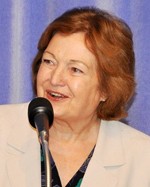 Mairead Corrigan Maguire,
Mairead Corrigan Maguire,
Nobel Peace Prize Laureate, (1976) Ireland
Please accept my condolences on the
Death of Thich Quang Do
His spirit of peace and nonviolence
Was an inspiration to many people
And he will be remembered for
His great witness to loving kindness
To all
Peace
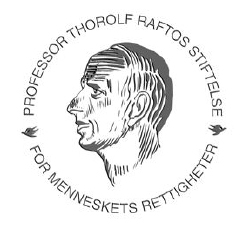 Rafto Foundation,
Rafto Foundation,
Bergen, Norway
“I am isolated but I am not alone, for I am part of the Rafto family (Thích Quảng Độ in a recorded message at the Rafto Foundation 30th year anniversary in 2016).
It is with great sadness the Rafto Foundation received the news that the most Venerable Thích Quảng Độ, Rafto laureate 2006, passed away on Saturday 22nd February, aged 93. As a Buddhist monk, dissident, scholar and patriarch of the Unified Buddhist Church of Vietnam (UBCV) he dedicated his life to the promotion of democracy, human rights and religious freedom in Vietnam.
As a human rights defender Thích Quảng Độ payed a heavy price. He was persecuted, imprisoned and tortured. He has spent the last three decades in house arrest and has been under close government control and surveillance until his very last moment.
“Thich Quang Do’s non-violent struggle for human rights, democracy and religious freedom will continue to be a great inspiration to the Rafto Foundation and to his many followers in Vietnam and internationally. He will be deeply missed by the entire Family of Rafto Laureates, that he was such an important part of, despite his isolation. We will contribute to keeping his legacy alive”, says Jostein Hole Kobbeltvedt, Executive Director of the Rafto Foundation for Human Rights.
Thích Quảng Độ was never allowed by Vietnamese authorities to travel to Norway to receive the Thorolf Rafto Memorial Prize in 2006. Therese Jebsen of the Rafto Foundation was arrested and interrogated by Security Police when she came to the Thanh Minh Zen Monastery to hand Thích Quảng Độ the Award diploma.
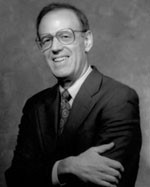 Carl Gershman,
Carl Gershman,
President, National Endowment for Democracy
Thich Quang Do was admired by freedom-loving people around the world, and they mourn his passing. He was an example for all humanity of tolerance, compassion, and devotion to human rights and dignity. He suffered greatly for his courage and his unyielding commitment to principle and truth.
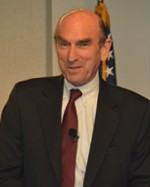 Elliott Abrams,
Elliott Abrams,
Senior Fellow, Council on Foreign Relations, Former Chairman, US Commission on International Religious Freedom (USCIRF), Former US Secretary of State for Human Rights
Thich Quang Do was a hero to millions around the world for his steadfast, peaceful, conscientious support of the freedom of his own people and the cause of freedom around the world. He is one of the millions of victims of communism who paid with years of suffering, deprivation, and isolation for his insistence on freedom of conscience, thought, and religion. Few of us can aspire to the courage he always showed, but we can all be inspired by his life of benevolence and dedication.
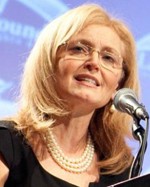 Dr. Katrina Lantos Swett,
Dr. Katrina Lantos Swett,
President, Lantos Foundation, USA; Past Chair, USCIRF
I join millions around the world in mourning the passing of the Most Venerable Thich Quang Do, Patriarch of the Unified Buddhist Church of Vietnam Nam.
Thich Quang Do, was surely a light that shone in the darkness- standing with unflinching courage and integrity for freedom of religion, conscience and belief for all people everywhere. His life’s journey was one of selfless sacrifice and though he has passed on, the illumination and understanding that he brought to so many shines on. Because of him, the hope for freedom, democracy and human rights continues to burn in Vietnam Nam and beyond.
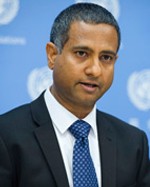 Dr. Ahmed Shaheed,
Dr. Ahmed Shaheed,
UN Special Rapporteur on Freedom of Religion or Belief
“It is with deep sadness that I learned of the passing of Patriarch Thich Quang Do in Saigon. During this time of mourning I would like to express sincere condolences to the Buddhist community in Vietnam and pay tribute to Thich Quang Do’s life-long and courageous commitment to peace and the freedom of conscience.”
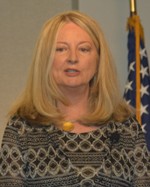 Nina Shea,
Nina Shea,
Director of the Center for Religious Freedom, Hudson Institute, USA
I am very sorry to hear this news. Thich Quang Do was a great example of the struggle for religious freedom. While confined and repressed, he, through strong conviction and gentle resistance, drew admiration from throughout the world and across religions. His life will continue to inspire me and all who knew of him, thanks to your own tireless efforts on his behalf. With deepest condolences,
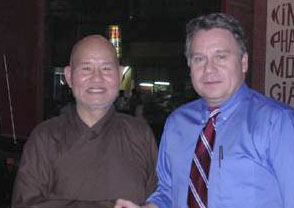 Chris Smith,
Chris Smith,
Member of the US Congress
“I am deeply saddened to hear that the Most Venerable Thich Quang Do passed away over the weekend at age 91,” said Smith, who has chaired 11 hearings on human rights in Vietnam. “He was a courageous champion for human rights in Vietnam and one of the world’s longest held prisoners of conscience. I had the privilege to meet him during a visit to Vietnam. He called to account Vietnam’s communist regime for its suppression of Buddhists, Christians, Cao Dai, Hoa Hao and other religious believers and was detained unjustly for decades until his death. His dream of a Vietnam where everyone can speak their mind or practice their beliefs without coercion will never die and one day, hopefully soon, will be realized.”
 Kristina Arriaga,
Kristina Arriaga,
former Vice-Chair, US Commission on International Religious Freedom
Venerable Thich Quang Do’s courage before oppression and resilience during imprisonment reminded the world that we are all are born in dignity, with the right to live according to our deeply held convictions. The world is a richer place because he lived amongst us and sacrificed his freedom so others could keep theirs. Freedom-loving people all over the world will mourn him. I am heartbroken.
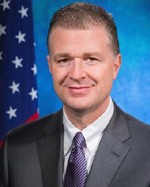 Daniel J. Kritenbrink,
Daniel J. Kritenbrink,
US Ambassador to Vietnam
On behalf of the U.S. Mission in Vietnam, I would like to express our sincere condolences on the passing of The Venerable Thich Quang Do, Patriarch of the Unified Buddhist Church of Vietnam.
Thich Quang Do was a tireless advocate for religious freedom and human rights, and he remained committed to the non-violent pursuit of justice. These peaceful efforts garnered him numerous international awards, and he was nominated several times for the Nobel Peace Prize.
I had the honor of meeting Patriarch Thich Quang Do in 2018, and I was deeply impressed by his compassion and commitment to religious pluralism.
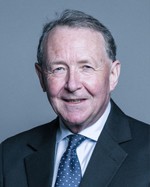 Professor the Lord Alton of Liverpool,
Professor the Lord Alton of Liverpool,
Member of the House of Lords, UK
Many will want to mark the passing of the Most Venerable Thich Quang Do, Patriarch of the Unified Buddhist Church of Vietnam, by recalling his courageous opposition to authoritarian attempts to silence his calls for multi-party democracy, freedom of religion or belief and human rights. During the many times that the Communist authorities detained him over the past 45 years of his life he refused to be cowed or silenced – and that has inspired many people not to lose hope in their own struggle for fundamental rights and freedoms.
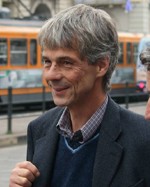 Olivier Dupuis,
Olivier Dupuis,
former Member of the European Parliament
A thought, a shared thought, for the Venerable Thich Quang Do. Yesterday, the Patriarch of the United Buddhist Church of Vietnam soared to new, unvisited heights.
Thich Quang Do, upon whom Hanoi’s Leninist dictatorship inflicted prisons, re-education camps and house arrest for more than forty years, leaves us in legacy his incredible spirit of Resistance, his keen sense of Politics and his uncompromising love of Liberty, the Rule of Law and Democracy. Thank you Thich Quang Do.
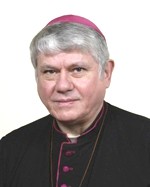 Václav Malý,
Václav Malý,
Catholic Bishop of Prague, Czech Republic
I feel sincere regret and compassion due to the death of Most Venerable Thich Quang Do, Patriarch of the Unified Buddhist Church of Vietnam. He was a brave man advocating human dignity and supporting peaceful co-existence of people with various religious confessions.
 Representative of Christian Solidarity Worldwide,
Representative of Christian Solidarity Worldwide,
United Kingdom
I am so sorry to hear of the passing of the Most Venerable Thich Quang Do. His courage and commitment to freedom and human rights have been an inspiration to so many. He will be greatly missed. My thoughts are with everyone affected by this loss.
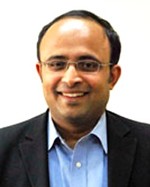 Rajiv Narayan,
Rajiv Narayan,
Director of Policy, International Commission against the Death Penalty, Madrid
I heard the news a few minutes ago on BBC news of the sad passing away of the Rev. Thich Quang Do. I felt very sad and yet inspired by his extraordinary fight and staunch activism and fight for the human dignity, for freedoms of expression, association, belief, religion in the face of extremely harsh punishment.
Vo Van Ai and Penelope, my thoughts and prayers go to you and your friends and supporters like Therese and Rafto Foundation for carrying on his struggle, believing and giving voice to his message which has such global resonance, especially today. As a saying in India goes, as long as the memory and the values of Rev. Thich Quang Do remains, he remains alive. And your efforts will continue to do so.
Wilson Ip,
Independent Human Rights Analyst
I am very saddened to hear about the passing of Ven Thich Quang Do. He is now in a place beyond earthly shackles. I hope his spirit continues to inspire those in Vietnam and around the world to continue the pursuit for true freedoms. Keep up the good fight!
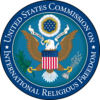 United States Commission on International Religious Freedom (USCIRF)
United States Commission on International Religious Freedom (USCIRF)
Washington, DC, 25.2.2020 — The United States Commission on International Religious Freedom (USCIRF) mourned the passing of Patriarch Thích Quảng Độ, the leader of the Unified Buddhist Church of Vietnam (UBCV). He was under effective house arrest at Thanh Minh Zen Monastery in Ho Chi Minh City from 2001 to late 2018, when he was able to flee to Tu Hieu pagoda, where he passed away on Saturday evening. USCIRF had advocated for Patriarch Thích Quảng Độ through the Religious Prisoners of Conscience Project. A USCIRF delegation met with him in September 2019.
“This is an incredible loss for the people of Vietnam,” USCIRF Chair Tony Perkins stated. “USCIRF urges the Vietnamese government to let UBCV members mourn their departed leader in peace.”
“I had the honor of meeting Patriarch Thích Quảng Độ at his pagoda this past fall,” added Commissioner Anurima Bhargava. “With his quiet strength and grace, he fought for decades to preserve and promote religious freedom in Vietnam.”
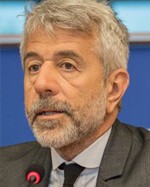 Marco Perduca
Marco Perduca
Former Senator, Italy; Coordinator, Science for Democracy
I just heard the sad news of the death of the venerable Thích Quang Do.
At the age of 92, it is not unusual for a person to leave this world. But it is unusual for a 92-year-old to die without freedom. A private freedom from a regime that, among many other rights, systematically denies the right to pray alone or in an organized manner.
A regime that in violating freedom of worship has found its new god: money.
The first chapter of my book “Radical Farnesina” is called “persona non-grata”. A good part of it is dedicated to Thích Quang Đo and his fight for freedom – a struggle that was fully political, because cultural and religious, and that – above all – was honestly liberal.
A model of existence and nonviolent resistance that needs to be made known today even more than ever.
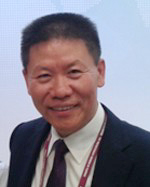 Bob Fu
Bob Fu
Founder and President, ChinaAid
I am so sorry to hear about the loss of one of the world’s most fearless leaders for religious freedom, democracy, and human rights in Vietnamese Buddhist leader Thich Quang Do. He will remain an intellectual pillar and unifying force for freedom-loving people in Vietnam and around the world for generations to come.
********
Thich Quang Do, Defiant Rights Champion in Vietnam, Dies at 91
As the patriarch of a banned Buddhist church, he endured prison, house arrest and internal exile but refused to bend to the Communist authorities.
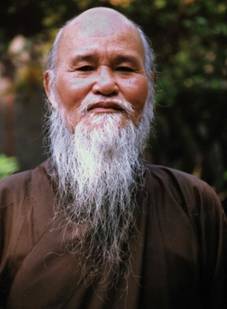
Thich Quang Do after being released from prison in Ho Chi Minh City in 1998. “Without democracy and pluralism we cannot combat poverty and injustice nor bring true development to our people,” he declared.Credit…Agence France-Presse
By Seth Mydans
Published Feb. 24, 2020 – Updated Feb. 25, 2020
Thich Quang Do, the patriarch of the banned Unified Buddhist Church of Vietnam and a defiant champion of religious freedom, democracy and human rights in his country, died on Saturday. He was 91.
His death was confirmed by the Paris-based International Buddhist Information Bureau, an arm of his church. There was no information on where he died. A spokeswoman for the organization said that the Vietnamese authorities had held him incommunicado at the Tu Hieu Pagoda in Ho Chi Minh City and that it had been impossible for members of his organization to make contact with him. He had diabetes and a heart condition for many years, she added.
Thich Quang Do had for decades repeatedly challenged, and angered, the Communist government on issues of religious and political freedom and had effectively been under house arrest since 2003. He had spent the last 30 years or so in and out of prison, under house arrest or forced into internal exile for refusing to submit the Unified Church to government control.
He issued a stream of public statements over the years, putting him in the forefront of religious activism in Vietnam, which permits only a single government-sanctioned Buddhist organization. The Unified Church, founded as an umbrella organization for various Buddhist sects in 1964, was banned.
His themes were as much secular as religious, echoing some of the main concerns of political dissent in Vietnam.
One such statement, delivered in a video message to the United Nations in 2005, amounted to a political manifesto.
“Without democracy and pluralism we cannot combat poverty and injustice nor bring true development to our people,” the statement said. “Without democracy and pluralism we cannot guarantee human rights, for human rights cannot be protected without the safeguards of democratic institutions and the rule of law.”
In 2001, Thich Quang Do published “Appeal for Democracy in Vietnam,” an eight-point declaration calling for a multiparty system, free elections, independent trade unions and the abolition of “all degrading forms of imported culture and ideologies that pervert Vietnamese spiritual and moral values.”
He was instrumental in forging links between dissidents in the north and south, ending a decades-long geographical and ideological divide. As well, he was a respected scholar with more than a dozen published works, including novels, poetry, translations and studies of Vietnamese Buddhism.
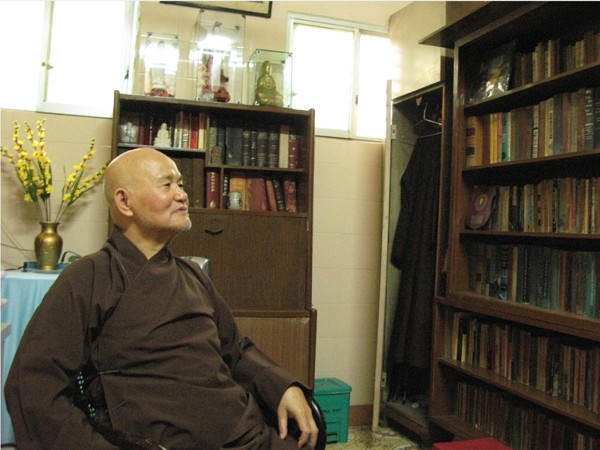
Thich Quang Do in 2007 at a monastery in Ho Chi Minh City, where he was under house arrest. A simple vow to combat intolerance, he said, led him “down a path paved with prison cells, torture, internal exile and detention.” Credit…Aude Genet/Agence France-Presse — Getty Images
Thich Quang Do received a number of human rights awards, including Norway’s Rafto Prize, which cited “his personal courage and perseverance through three decades of peaceful opposition against the Communist regime in Vietnam.”
In 1978, he and Thich Huyen Quang, the patriarch of the Unified Church at the time, were nominated for the Nobel Peace Prize by the Irish peace activists Betty Williams and Mairead Corrigan Maguire, the 1976 laureates.
The Commission on International Religious Freedom, an independent body established by Congress, spoke out on Thich Quang Do’s behalf in 2018. Its vice-chairwoman at the time, Kristina Arriaga, said, “I urge the government of Vietnam to respect his freedom of movement and freedom to reside wherever he chooses.”
Thich Quang Do was born Dang Phuc Tue, on Nov. 27, 1928, in Thai Binh Province, in northern Vietnam. He assumed the Dharma name Thich Quang Do after becoming a monk at the age of 14. Thich is an honorary family name used by monks and nuns.
He said his life’s course was set at the age of 17, when he witnessed the execution of his religious master, Thich Duc Hai, by a Communist revolutionary tribunal. “Then and there I vowed to do all that I could to combat fanaticism and intolerance and devote my life to the pursuit of justice through the Buddhist teachings of nonviolence, tolerance and compassion,” he wrote in 1994, in an open letter to Do Muoi, the general secretary of Vietnam’s Communist Party at the time.
He added: “Little did I realize how that simple vow would lead me down a path paved with prison cells, torture, internal exile and detention for so many years to come.”
In the early 1950s, Thich Quang Do traveled for six years as a young research fellow in Buddhist philosophy at universities in India and Sri Lanka. In the 1960s and ’70s, he was a professor of oriental studies and Buddhist philosophy at universities in Vietnam.
He and thousands of Buddhists were arrested in 1963 in a broad crackdown by the government of Ngo Dinh Diem, but he was released a few months later when Diem was deposed and assassinated in a military coup.
The Communist side won the Vietnam War in 1975, and two years later Thich Quang Do was put in solitary confinement for his attempts to organize a nonviolent struggle to protect religious freedom. Beginning in the 1980s he spent a decade in internal exile as punishment for his activism and public statements. His 84-year-old mother was exiled with him, and died in 1985 from malnutrition and inadequate medical care.
In a turnaround, the Communist government in 1990 invited him to take up a post in the state-sponsored Vietnam Buddhist Church, but he refused and continued his opposition.
In April 2006, in the early years of his final term of house arrest, he predicted the ultimate victory of his secular ideals.
“There will come a time when the authorities will be unable to silence all of the people all of the time,” he said. “The moment will come when the people will rise up, like water bursting its banks,” and when that happens, he added, “the situation in Vietnam will be forced to change, and a democratic process will emerge.”
Seth Mydans reported as a foreign and national correspondent for The New York Times and its sister publication, The International Herald Tribune, from 1983 to 2012. He continues to contribute to The Times.
A version of this article appears in print on Feb. 27, 2020, Section A, Page 26 of the New York edition with the headline: Thich Quang Do, 91, Buddhist Monk and Rights Champion in Vietnam.

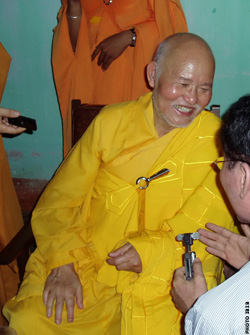

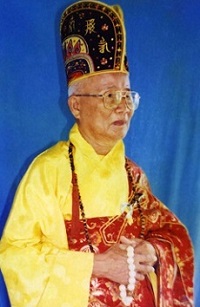


0 Comments
You can be the first one to leave a comment.